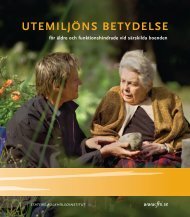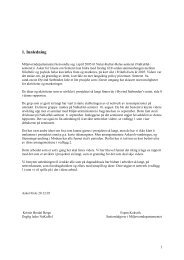Green Care: A Conceptual Framework - Frisk i naturen
Green Care: A Conceptual Framework - Frisk i naturen
Green Care: A Conceptual Framework - Frisk i naturen
Create successful ePaper yourself
Turn your PDF publications into a flip-book with our unique Google optimized e-Paper software.
way to ‘measure’ the outcomes is to listen to the experiences and views<br />
of participants. Much good work has been carried out exploring the<br />
perceptions of green care participants, looking at how green care benefits<br />
the individual. Some of these studies have been described throughout this<br />
document.<br />
Hence, qualitative research shows that green care is valued, enjoyed and<br />
considered to be personally beneficial. Therefore, is there a need for any<br />
other type of evidence or research?<br />
There is often an assumption or perhaps an expectation that such benefits<br />
are founded on changes in psychological functioning or changes in clinical<br />
condition that are directly attributable to green care. Whilst it may be true<br />
that if a client reports that he or she feels happier then there has been some<br />
psychological change, this does not mean that any underlying condition<br />
has necessarily been altered by participation in green care. It may have –<br />
but if we wish to claim that green care directly changes a client’s clinical<br />
condition or affects any disease process then we need to test it in the same<br />
way as any medicinal product might be tested.<br />
Whilst those in the green care movement and many of those in health care<br />
may consider the experiences of participants to be the best evidence of<br />
effectiveness, many of those responsible for formulating health policy and<br />
providing funding are firmly rooted in the world of quantitative data and<br />
randomised controlled trials (RCTs). This is the currency of the regulatory<br />
authorities that give approval for new medicines.<br />
Complex interventions are difficult to study and as a result, controlled trials<br />
are the ‘gold standard’ of some green care researchers and the antithesis<br />
of others. That is certainly the experience of those in the Therapeutic<br />
Community movement where there have been few such trials and where<br />
also the issue is hotly debated. For example, Manning (2004), explored<br />
the potential of RCTs in researching the effectiveness of the therapeutic<br />
community approach to mental ill health and concluded:<br />
“The RCT is for many observers of medical and social practice<br />
a powerful method of developing a strongly legitimate means<br />
for gathering evidence which carries extensive social power.<br />
However, the RCT as practised is not an appropriate gold<br />
standard solution for all problems. It certainly cannot be<br />
the required standard for an assessment of the therapeutic<br />
114 <strong>Green</strong> <strong>Care</strong>: A <strong>Conceptual</strong> <strong>Framework</strong>















